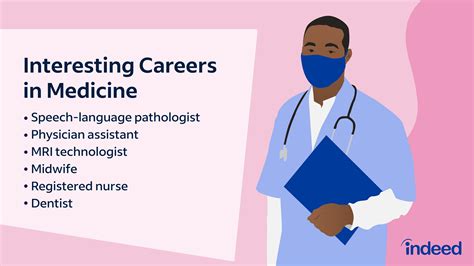Intro
Kickstart your medical career with entry-level medical jobs that offer valuable experience and growth opportunities. Explore various roles, including medical assistants, pharmacy technicians, and health information technicians, and discover the skills and qualifications required to succeed in these in-demand positions.
Breaking into the medical field can be a daunting task, especially for those just starting their careers. With so many specialized roles and high levels of education required, it's easy to feel overwhelmed. However, there are many entry-level medical jobs that can provide a foot in the door and a solid foundation for a future career in healthcare.
The medical field is not only a rewarding and challenging career path, but it's also a field with a high demand for skilled professionals. According to the Bureau of Labor Statistics, employment of healthcare occupations is projected to grow 14% from 2020 to 2030, much faster than the average for all occupations. This growth is driven by an aging population, an increased focus on preventive care, and the need for healthcare services.

Types of Entry-Level Medical Jobs
There are many types of entry-level medical jobs that can provide a starting point for a career in healthcare. Some of these roles include:
Certified Nursing Assistant (CNA)
A Certified Nursing Assistant (CNA) is a healthcare professional who assists nurses and other medical staff with patient care. CNAs typically work in hospitals, nursing homes, and other healthcare facilities. To become a CNA, one must complete a training program and pass a certification exam.
Medical Assistant
A Medical Assistant is a healthcare professional who supports the work of healthcare providers. Medical Assistants typically perform administrative and clinical tasks, such as taking vital signs, preparing patients for exams, and recording medical histories.
Pharmacy Technician
A Pharmacy Technician is a healthcare professional who assists pharmacists with dispensing medication and other tasks. Pharmacy Technicians typically work in pharmacies, hospitals, and other healthcare facilities. To become a Pharmacy Technician, one must complete a training program and pass a certification exam.
Dental Assistant
A Dental Assistant is a healthcare professional who supports the work of dentists and hygienists. Dental Assistants typically prepare patients for exams, take x-rays, and assist with procedures.
Medical Biller
A Medical Biller is a healthcare professional who prepares and submits medical claims to insurance companies. Medical Billers typically work in hospitals, clinics, and other healthcare facilities.
Education and Training Requirements
While some entry-level medical jobs require a degree or certification, others may require only a high school diploma or equivalent. Here are some education and training requirements for the roles mentioned above:
Certified Nursing Assistant (CNA)
- Complete a CNA training program ( typically 4-12 weeks)
- Pass a certification exam
Medical Assistant
- Complete a Medical Assistant training program (typically 9-12 months)
- Pass a certification exam (optional)
Pharmacy Technician
- Complete a Pharmacy Technician training program (typically 6-12 months)
- Pass a certification exam (optional)
Dental Assistant
- Complete a Dental Assistant training program (typically 9-12 months)
- Pass a certification exam (optional)
Medical Biller
- Complete a Medical Billing training program (typically 6-12 months)
- Pass a certification exam (optional)

Skills and Qualities Required
While education and training are essential for entry-level medical jobs, there are also certain skills and qualities that are required to succeed in these roles. Some of these skills and qualities include:
Communication Skills
- Ability to communicate effectively with patients, healthcare providers, and other medical staff
Compassion and Empathy
- Ability to provide emotional support and care to patients and their families
Attention to Detail
- Ability to accurately record medical information and perform tasks with precision
Organizational Skills
- Ability to prioritize tasks and manage time effectively
Teamwork
- Ability to work collaboratively with other healthcare professionals

Salary and Benefits
The salary and benefits for entry-level medical jobs vary depending on the role, location, and employer. Here are some approximate salary ranges for the roles mentioned above:
Certified Nursing Assistant (CNA)
- Median salary: $30,000 - $50,000 per year
Medical Assistant
- Median salary: $30,000 - $50,000 per year
Pharmacy Technician
- Median salary: $30,000 - $50,000 per year
Dental Assistant
- Median salary: $30,000 - $50,000 per year
Medical Biller
- Median salary: $30,000 - $50,000 per year

Conclusion
Entry-level medical jobs can provide a rewarding and challenging career path for those just starting out in the healthcare field. While education and training are essential for these roles, there are also certain skills and qualities that are required to succeed. With the right skills, qualities, and education, individuals can excel in these roles and advance their careers in the medical field.
What are some entry-level medical jobs that do not require a degree?
+Some entry-level medical jobs that do not require a degree include Certified Nursing Assistant (CNA), Medical Assistant, and Pharmacy Technician. These roles typically require a training program or certification.
What are some skills and qualities required for entry-level medical jobs?
+Some skills and qualities required for entry-level medical jobs include communication skills, compassion and empathy, attention to detail, organizational skills, and teamwork.
What is the salary range for entry-level medical jobs?
+The salary range for entry-level medical jobs varies depending on the role, location, and employer. However, approximate salary ranges for these roles include $30,000 - $50,000 per year.

